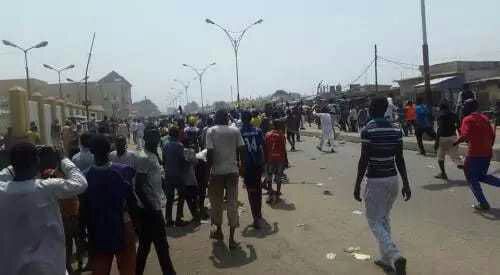Kaduna State is a state in central northern Nigeria with its capital as Kaduna.
The state is the successor to the old Northern Region of Nigeria, which had its capital at Kaduna. In 1967 this was split up into six states, one of which was the North-Central State, whose name was changed to Kaduna State in 1976. This was further divided in 1987, losing the area now part of Katsina State.
The Hausa and some immigrants from the southern states practice Islam and majority of the people in the southern LGAs profess Christianity. The state has over 7 million Nigerians as residents as well as indigenes.
However, the state is known for its violence that erupts anytime rather than its fragile peace.
History books say violence has been a regular occurrence in the state since 1900 and has over the years degenerated to massive killings, wanton destruction of properties in the state.
The violence according to affected parties suggests that there is an ethnic, political and on a bigger scale, religious undertone in the crisis.
It will be recalled that in May 2011, Human Rights Watch after the Presidential Elections, (an election, the current Nigerian President lost to his predecessor), at least 180 people, and possibly more, were killed in the cities of Kaduna and Zaria and their surrounding suburbs. The presidential elections in Nigeria divided the country along ethnic and religious lines.
In the predominately Christian towns and villages of southern Kaduna State, including Zonkwa, Matsirga, and Kafanchan, sectarian clashes left more than 500 dead, according to Muslim and Christian leaders.
According to the Christian Association of Nigeria, (CAN) the umbrella organization representing the majority of Christian churches in Nigeria, at least 170 Christians were killed in the post-election riots, hundreds more were injured, and thousands displaced. The organization also reported that more than 350 churches were burned or destroyed by the Muslim rioters across 10 northern states.
CAN have also said over 800 people have been killed between November 2016 and January 2017 in Kaduna following a fresh crisis that erupted. It was widely reported that the Fulani herdsmen as they had done in other parts of the country were responsible for the violence. It is said they invaded lands of their victims with the intention to graze as well as take over their lands.
In a YouTube video done by the Osasu Show, closely watched by the HERALD, more facts emerged as to the causes of the crisis. Both sides of the Kaduna state – the Fulanis and Southern Kaduna spoke to the host.
It will be recalled that the Governor of the state, Mallam Nasir El-Rufai had revealed that his government has paid money to Fulani Herdsmen to pacify them to stop killing in Southern Kaduna.
The region, as well as some parts of the south, has been affected by rampaging herdsmen who kill and sometimes destroy crops.
According to him, the genesis of the crisis was when the Fulani herdsmen from neighbouring countries brought their cattle to Nigeria and couldn’t return to their country as the post-election violence in 2011 affected them as some of them were killed while cattle destroyed.
In his words, “Fulani herdsmen from across Africa bring their cattle down towards Middle Belt and Southern Nigeria. The moment the rains starts around March, April, they start moving them up to go back to their various communities and countries.
“Unfortunately, it was when they were moving up with their cattle across Southern Kaduna that the elections of 2011 took place and the crisis trapped some of them.
“Some of them were from Niger, Cameroon, Chad, Mali and Senegal. Fulanis are in 14 African countries and they traverse this country with the cattle.
“So many of these people were killed, cattle lost and they organised themselves and came back to revenge.
“So a lot of what was happening in Southern Kaduna was actually from outside Nigeria. We got a hint that the late Governor Patrick Yakowa got this information and he sent someone to go round some of these Fulani communities, but of course after he died, the whole thing stopped. That is what we inherited. But the Agwai committee established that.
However, from the Osasu show video, a Southern Kaduna village head, Hon Gideon Moric narrated how his daughter Anna was brutally murdered on the 24th December 2016 by the herdsmen despite the 24-hours curfew imposed by the state governor. A visibly emotional accused the Dagoma village of attacking them.
He accused the state government of being behind the crisis as means to reduce their numbers and the rest of the villagers were in agreement with that notion.
For a balanced view, the Galadima of Dagoma village denied their involvement of his people in the crisis. He said the Kangora people attacked the Gaska community.
He is of the opinion that Christians and Muslims can live together as one in peace and unity. According to him, his community is hated because of the nickel found in their lands. He further said that once men don’t adhere to the word of God, there would be suffering.
He accused the Goska of not being peaceful. He claims that his community gave the Goska community their lands several years ago.
However, he listed his conditions for peace to rain – creation of an Emirate council; roads; political wards. He asserted that it is not possible to drive away a Fulani from Southern Kaduna.

